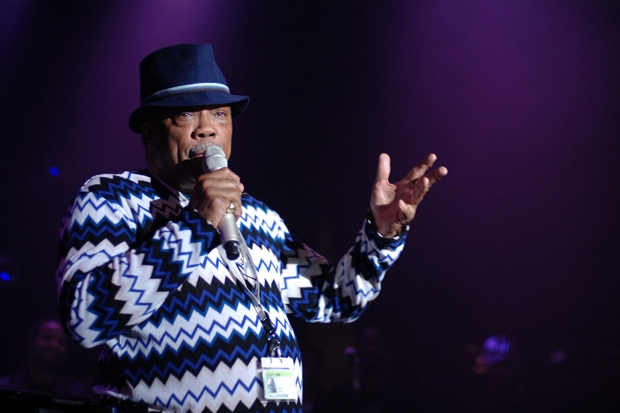‘We think we’re in charge of this stuff but we’re not,’ said Quincy Jones, the composer, arranger, jazz trumpeter, musical genius. He was talking to Julian Joseph at the Montreux Jazz Festival for Jazz Line-Up on Radio 3 (Saturday). ‘It’s divine intervention.’
Jones, who masterminded Michael Jackson’s Thriller as well as countless other hits, film scores (including The Italian Job and The Color Purple) and his own ‘Soul Bossa Nova’, was remarkably sanguine about his extraordinary career. His enormous self-confidence was there from the start. Finding himself in Paris in the 1950s touring with a big band, he decided to stay on so that he could study with Nadia Boulanger and learn how to write for a symphony orchestra. ‘You have to master your skill,’ he said.
On Monday night, the Prom at the Albert Hall will be devoted to his music, the walls ringing out to jazz classics, funk and pop from the Metropole Orkest, in recognition of Jones’s ability to criss-cross musical genres. How does he manage to exist in so many different musical worlds? ‘Your music will never be more or less than what you are as a human being,’ Jones replied, in which case he must be some human.
‘They are bodily representations of mortality,’ said Marie-Louise Muir about the keening songs which used to be sung by women in Ireland during the three-day wakes held at the homes of those who had died, the coffin lying open for all to see. The keeners were paid to come and sing, professionals who made money out of their ability to express grief in song. In Songs for the Dead on Radio 4 (Tuesday), Muir went to Inis Mór, off the west coast of Ireland, to visit women who still remembered the sound of real keening.
‘It was weird and lonesome,’ they recalled, and often rather hard to listen to, the songs more like wailing, the voices harsh and weathered. ‘It would take the heart out of you.’ But it did help those shocked by death to find the words to cope with what they were feeling. The songs about the pain of being left, and pleading with the departed not to leave, allowed those who had been left behind to open up, to let their emotions well up.
Now that keening has, in effect, been silenced, death has become less marked, less woven into daily life, Muir observed. ‘You’re supposed to take death more lightly. Not to dwell on it.’ But could this explain why more and more people are ending up at the GP, needing pills?
In The Museum of Lost Objects on the World Service (Sunday), Kanishk Tharoor talked to archaeologists who have worked in Syria about how they are looking for ways to deal with their grief at the loss of key historical sites in that country, which have been destroyed by Daesh and left in ruins after more than 2,000 years. Is there any point in reconstructing what has been crushed into dust, or preserving them as 3-D digital images? Or should their preservation be left to memory? What, in effect, do these sites represent? The Temple of Bel at Palmyra, for instance, had already been a ruin for centuries. Now that even those remnants have been destroyed, how should its former existence be preserved?
Tharoor talked to an art historian who had spent several years living within the temple compound, as well as to the daughter of the Syrian professor who was so viciously beheaded within the temple he had loved and studied for years. He named his daughter Zenobia after the Syrian empress who had ruled with such power and success in the third century ad. Her image on the Syrian currency represented both Syrian and Arab nationalism, just as several different gods were all worshipped in the Temple of Bel. It was a place where different cultures came together spiritually. Zenobia says there is no point in her going back to Palmyra; it’s too full of painful memories. She would prefer to think of her father as being just like the palm trees that are rooted in the city, always connected and always standing strong.
Meanwhile the art historian does not want to see the temple resurrected. He was not impressed either by President Putin flying in an orchestra from Russia to perform western classics on the site of what was the temple, or by the former Mayor of London’s digital reconstruction of the temple screened in Trafalgar Square. On the contrary he would rather that whatever is constructed should be from what remains only — not to resurrect what once stood there, but for the temple to become a reminder of the vagaries of time and the barbarity of humans.
Elif Shafak, the Turkish writer, launched the new series of Four Thought on Radio 4 (Wednesday) with an impassioned lament for her country. She writes in English and now divides her time between London and Istanbul, but says she finds it easier to write about sorrow, melancholy and longing in Turkish. She sees her country as an ‘eccentric relative that you can neither trust nor stop loving’ and was horrified by the recent coup. ‘Once blood is shed, the scars will take decades to heal.’






Comments